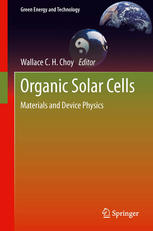

Most ebook files are in PDF format, so you can easily read them using various software such as Foxit Reader or directly on the Google Chrome browser.
Some ebook files are released by publishers in other formats such as .awz, .mobi, .epub, .fb2, etc. You may need to install specific software to read these formats on mobile/PC, such as Calibre.
Please read the tutorial at this link: https://ebookbell.com/faq
We offer FREE conversion to the popular formats you request; however, this may take some time. Therefore, right after payment, please email us, and we will try to provide the service as quickly as possible.
For some exceptional file formats or broken links (if any), please refrain from opening any disputes. Instead, email us first, and we will try to assist within a maximum of 6 hours.
EbookBell Team

4.0
96 reviewsOrganic solar cells have emerged as new promising photovoltaic devices due to their potential applications in large area, printable and flexible solar panels. Organic Solar Cells: Materials and Device Physics offers an updated review on the topics covering the synthesis, properties and applications of new materials for various critical roles in devices from electrodes, interface and carrier transport materials, to the active layer composed of donors and acceptors.
Addressing the important device physics issues of carrier and exciton dynamics and interface stability and novel light trapping structures, the potential for hybrid organic solar cells to provide high efficiency solar cells is examined and discussed in detail. Specific chapters covers key areas including:
Latest research and designs for highly effective polymer donors/acceptors and interface materials
Synthesis and application of highly transparent and conductive graphene
Exciton and charge dynamics for in-depth understanding of the mechanism underlying organic solar cells.
New potentials and emerging functionalities of plasmonic effects in OSCs
Interface Degradation Mechanisms in organic photovoltaics improving the entire device lifetime
Device architecture and operation mechanism of organic/ inorganic hybrid solar cells for next generation of high performance photovoltaics
This reference can be practically and theoretically applied by senior undergraduates, postgraduates, engineers, scientists, researchers, and project managers with some fundamental knowledge in organic and inorganic semiconductor materials or devices.